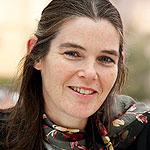
Daphne Koller will present her ground-breaking work in free, universally accessible college education as the first guest speaker in the 2012 -2013 John R. and Donna S. Hall Engineering Lecture Series.
The lecture – The Online Revolution: Education for Everyone – is Tuesday, Oct. 2 at 4:10 p.m. in Vanderbilt’s Wilson Hall, Room 103. The lecture is open to the Vanderbilt community. A reception will follow.
Live video of this event will be streamed on Vanderbilt News and will be available for viewing after Oct. 2.
Daphne KollerKoller is the Rajeev Motwani Professor in Computer Science at Stanford University and co-founder of the social entrepreneurship company Coursera. Last year approximately 350,000 students enrolled in three free courses offered by Stanford, creating one of the largest experiments in online education ever performed.
“I’ll report on this far-reaching experiment in education, and why we believe this model can provide both an improved classroom experience for our on-campus students, via a flipped classroom model, as well as a meaningful learning experience for the millions of students around the world who would otherwise never have access to education of this quality,” Koller said.
“Through such technology, we envision millions of people gaining access to the world-leading education that has so far been available only to a tiny few, and using this education to improve their lives, the lives of their families, and the communities they live in.”
Koller will review the teaching methodologies used in the free coursework, including easy-to-create video chunks, a scalable online Q&A forum where students can get their questions answered quickly, sophisticated auto-graded homework, and a peer grading pipeline that supports the at-scale grading of open-ended assignments.
After launching Coursera early in 2012, Koller and co-founder Andrew Ny initially formed partnerships with Princeton, Stanford, University of Pennsylvania and University of Michigan. Coursera’s operations have grown to include 16 university partners, with more than 1 million students enrolled. Presently, 120 courses are offered across 16 categories, including biology, computer science, business, medicine, electrical engineering, education, humanities and social sciences.
Students worldwide can engage in classes in “Astrobiology and the Search of Extraterrestrial Life” with the University of Edinburgh, for example, or “Aboriginal Worldviews and Education” with the University of Toronto. A computer science class in programming, in French, is offered with the École Polytechnique Fédérale de Lausanne located in Lausanne, Switzerland.
Coursera’s course choices and staff have increased along with additional funding, derived from several universities and private firms that share the company’s goal of quality, accessible online education. Coursera staffers continue to hone the design and operations of interactive computer learning focused on significant peer-to-peer dialogue.
Koller, who pioneered in her Stanford class many of the ideas that underlie the Coursera user experience, received her BSc and MSc from the Hebrew University of Jerusalem, and her Ph.D. from Stanford in 1994. A member of the National Academy of Engineering, her many awards include the Presidential Early Career Award for Scientists and Engineers (PECASE) and the MacArthur Foundation Fellowship.
Established in 2002, the John R. and Donna S. Hall Engineering Lecture Series allows Vanderbilt engineering students to hear renowned engineers from universities and agencies address engineering topics of particular interest.